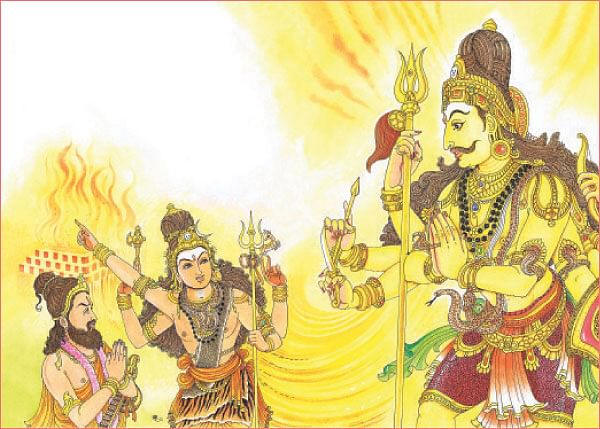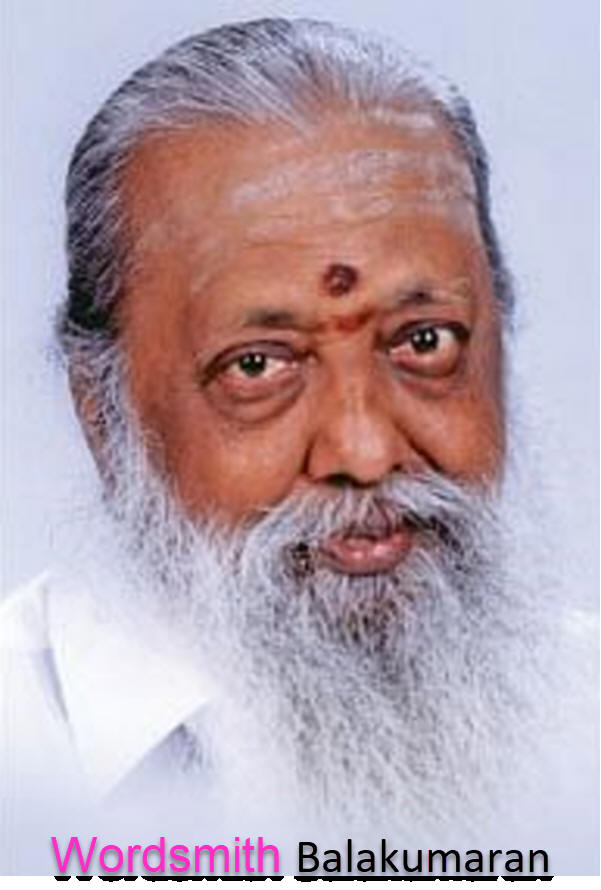Published:13 May 2013 8 PMUpdated:13 May 2013 8 PM Sakthivikatan
Vikatan Correspondent
Author: Wordsmith Balakumaran Images: Padmavasan
எழுத்துச் சித்தர் பாலகுமாரன், ஓவியம்: பத்மவாசன்
The story of Daksa's failure to invite Siva and Sati to the fire sacrifive.
1. This world believed that creative power is the best, that the creator
was great, and that he has the entitlement to all honors. That is not
the case. That is a mere flurry, pomposity, and a selfish
self-celebration: Most people do not know it.
2. A flying golden city of
immense size descended on earth with a humongous thud, destroying the
flora and the fauna of every size, roiling the lake, smashing the
forest, spreading the mud, and making life impossible to live.
3. A flying silver city descended on the earth, grazing the adjoining
mountains, raising mud and dust where it landed, destroying everything
and paralyzing life forms.
4. A flying iron city
landed heavily in another place, destroying even the worms by its weight
and heat and rendering the spot a wasteland.
5. The blue lake became a
dry and fissured land. Because of this devastation, the Devas did not
receive their customary homage from the earth, causing them distress.
They worried about the planet earth and its welfare. They wondered what
they could do to alleviate the conditions on earth. Nāradar talked with
them.
6. Vitthiyunmāli headed
the golden town, Thārakākṣan the silver town, and Kamalākṣan the iron
town. Nāradar met them, and they received him with loud laughter.
7. The heads: What do you
think of our strength?
8. Nāradar: Who are you?
9. We are Tārakāsūran's
sons. On our father's advice, we performed severe austerities (Tapas)
for hundreds and thousands of years. Extolling our Tapas, Brahma
appeared before us and declared he had no power to give us requested
immortality. Conferment of Immortality is in the hands of Śiva, who is
the destroyer. We asked for boons: Strength, cities of unique nature,
simultaneous death of us when we are together. Brahma gave us those
boons prompting us to circle the world with immense strength and
destroying one town at a time.
Saying thus, they all laughed riotously. The sound of victory
boomeranged.
10. Tapas has its elusive
objective, which one may miss. Creative fervor gives a humongous
arrogance, morphing the person into an Arkkar (demon).
11. The ability to create
something inculcates self-conceit in a person, giving him a feeling of
being at the summit of the world. All creators brim with arrogance. The
curse goes with creation.
Modesty is alien to the nature of a creator. If one is modest, he will
never be a creator.

12. Nāradar instigated the
Devas and said, "If you carry on like this, the earth will become
desolate, and there will be no one to pray to you. Go to Tirumāl (Viṣṇu)
for a resolution." They went to Tirumāl, paid homage. Tirumāl held
himself back and became thoughtful.
13. Viṣṇu thought I could
not destroy them. They sing songs of praise to Śiva,
live their life in the thoughts of Śiva, and know no one can
touch them under these circumstances. We have to draw them away from
their present thoughts and actions. We have to distract them from Śiva
and engage them in other matters. Their Buddhi needs remediation.
Thinking in like manner, Viṣṇu created a Puruṣa, well-versed in
Māyā (illusion and magic). The Puruṣa left the premises to tell the
three Arakkars (in charge of the golden, silver, and iron cities)
something greater than Śiva existed.
14. Nāradar appeared in
the trio's assembly hall and told them, "Adēde! Here I see the greatest
Māyā Meister. He taught me everything I know. Good things will happen to
whosoever pays homage to him. You reach the summit if you follow his
ideas. Therefore, cock your ears to him. I did the same to reach this
high position."
15. The Threesome heads:
If you pay homage to him, we are mere nothing. We will pay tribute to
him. "AYYā, what do you have to say."
16. The Māyā-meister
revealed to them what is beyond the purview of Śiva, what was opposing
Śiva, what confused, the earthly pleasures, their gradations, the
heights one could reach from those pleasures, and the tranquility that
came thereof. They were confused.
17. The three brothers
gave up Śiva panegyric and hated Śiva precipitating Śiva's anger. When
they were away from each other, Śiva destroyed each one of them.
(According to their boon, no one can kill them when they were together.)
18. Because of Nāradar's
provocation, the earth escaped from a colossal ruin. All the Devas paid
homage to Nāradar; the earth prospered again, and the earth people gave
the Devas their share of worship.
19. Because Nāradar took
Dakṣa's 2000 sons on a different path, Dakṣa bore daughters in place of
sons. He fathered hundreds of girls and married them off to Ṛṣis and
Munis, from whose goodwill, Dakṣa lived well. Praying to have Pārvati as
his daughter, he supplicated and had her as his daughter.
20. Brahma's daughter
Dakṣāyini left her father at age six, went elsewhere, and performed
austerities (Tapas) in the name Śiva. At the marital age of Dakṣāyini,
Śiva appeared before her and married her.
21.
Dakṣa was upset that his daughter married, without his
permission, an ash-smeared wanderer (Śiva) frequenting the funeral
grounds. He thought a woman's Buddhi is retrograde.
22. Dakṣa knew Śiva's
supreme qualities, and he was the end of all. But his Karma and
arrogance made him overlook Śiva's supremacy, spread falsity about Śiva
and think of him so low Dakṣa was ashamed of having Śiva as his
son-in-law. Because Dakṣa thought Śiva had an undue influence on his
daughter and married him,
he wanted to insult Śiva. Dakṣa vowed to take on the Supreme Soul.
23. How to insult Śiva.
Go to war. No, that is not
an option. Dakṣa hit upon an alternate idea. He said to himself: Let me
raise a big fire sacrifice. I invite all the Devas, except Śiva.
(No fire sacrifice is complete without the physical presence of
Śiva.)
24. Showing contempt, as a
punishment, to a person is the supreme insult, better than cutting and
casting him on the ground. He crowed with delight about his plan. He
invited all except Śiva for his fire sacrifice.
25. Dakṣayini heard about
the sacrifice on the grapevine. She indulged herself in a reverie. O, my
father is conducting a sacrifice. How come he did not inform and invite
me? Should I not go? He is my father. That was my house. Would he ignore
or oppose my visit? I must go. He invited all the gods except my
husband. What flaw did you
find in him? Why do you insult my husband? Is not your act a mistake? I
am your daughter. If you are my father, you must be his uncle. Is it not
proper that you treat him with respect? Should you not pay homage to my
husband and receive him with respect?
Why this forgetfulness? Why this denial?
26. Did you plan this fire
sacrifice to insult him?
Could you possibly insult him? He is supreme. Don't you know his
supremacy? Were you not the one who stood up and paid homage to him? You
know all the devas who pay respects to him. Did you not pray to them to
receive boons? Those devas-who gave you boons- raised their opposed
palms, lowered their heads in obeisance, fear, and trepidation, and
worshipped my husband. How could you be indifferent to him? How could it
be justifiable to disinvite my husband for the fire sacrifice when no
one could and would neglect him?
27. If I am your dear
daughter, and you are my father, you are a relation to Śiva. You invite
him. It would be best if you gave him the sacrificial offering. If you
deny his due, I do not know what will happen. Pārvati Devi raged inside.
